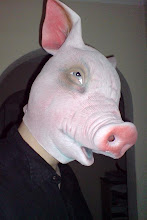So, the election's coming up and once again voting for either candidate would make me feel cheap and used. It's not that I think either one is awful - I don't. I think both want, in their own way, to make the US better. But then Pol Pot, in his own way, wanted to make Cambodia better, too. And, to a far lesser degree, US elections are inevitably about self-interest, about getting a little extra for your group at the expense of everyone else. Gotta love democracy. But until we evolve into an altruistic species with workaholic instincts, that's the best we can do.
In the meantime, this election shows just how fragmented we are. And that's interesting, considering how much more complicated life is compared to two hundred years ago. Back around 1800, practically everyone was either a farmer or a worker (craft or industry) or a shipper. So, the main measure of self-interest was tariffs. There was no personal income tax and no real safety net. People wanted protection for their own industry and free trade for the others. And, in practice, that meant tariffs got put on everything and things pretty much balanced out.
Now, people are defined by more attributes than just their line of work and those attributes have more variety. Religion is no longer just Protestants and Catholics. Race is no longer just white and black. Class is no longer just owners and workers. Education is no longer literate or not. Sexual preference is no longer straight or sent to prison for buggery. And, compared to two hundred years ago, we have a vast range of ways to spend our vastly greater free time. But, in the end, it all seems to come back to money.
Starting with unions about a hundred years ago, political organization has become the vehicle for grabbing a bigger slice of the tax pie. The twentieth century was the great era of political movements, both good and bad. The world saw drives for women's rights and racial equality. Developing countries stopped being colonies and became nations through well-organized independence movements. The world also saw the rise of fascism, communism, and dozens of local -isms that never strove to take over the world. So, for better or worse, political organization is the standard model for making voices heard.
And that's the toolbox we have. So, we get this election. Women heavily supporting Hillary Clinton. Blacks almost unanimously supporting Barack Obama, who also is strongly favored by younger voters. Old white people supporting John McCain. Evangelicals in love with Sarah Palin. Surely, some of this is contrary to narrow economic self-interest.
Surely, for example, many young people would gain little from Obama's policies - they would pay for old people's medical care, minimum wage increases would make finding temporary jobs more difficult, and Obama has said that he hopes to inspire young people to sacrifice for the good of everyone. Surely, many older people have little to gain from McCain's policies - they'd still be on the hook for their own health care, they are less able to learn the new skills that an open economy continuously demands, and they would happily trade growth for stability in their income stream.
Most people vote on economics, not principles. Most people are too absorbed in the daily struggle to make money to worry too much about anything else. So, what the hell is going on here? People want one of their own in power. Judging from people's voting patterns, many people feel they're likelier to gain from organization, from being part of a powerful negotiating bloc. Maybe they're right, maybe not. Or maybe people just fall back on identity politics when the issues are too complicated for average people to understand. And, without an education in economics and finance, at best important concepts are reduced to parroted slogans.
How many people understand that minimum wage increases will increase unemployment and encourage automation? That under free trade agreements, imports increase but so do exports? That, if employers are required to provide health care, they'll hire fewer workers to work longer hours? That when you tax corporations, you also cut into returns on investments for things like pension funds and university trusts? That recessions hurt but propping up failing businesses and industries costs more in the long run? That any job that's economically viable doesn't need to be protected? Not enough.
So, we vote for whoever's more like us.
That may be the best argument of all for smaller government.
Subscribe to:
Post Comments (Atom)

No comments:
Post a Comment